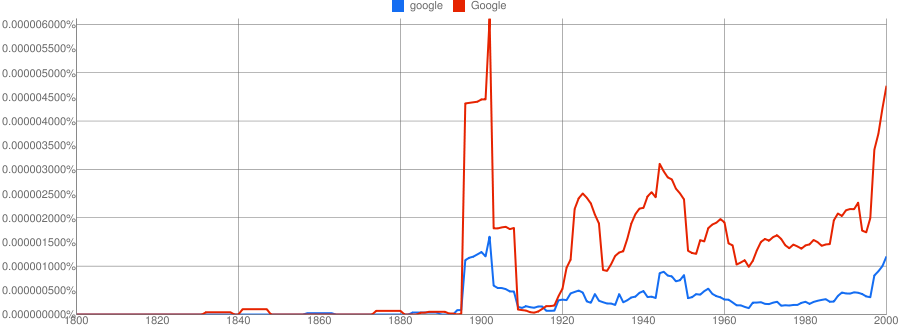Here's an attempt for an answer drawing from credible and/or official sources. The best sources we have are the books themselves that create the Ngram in the question. If we click through to some of the results between 1898 and 1902 (for example), we can categorise them as follows:
Variation of goggle-eyed:
- "Gilded, gilded o'er, gilt edge on, glorious, google eyed, got a big head, got a bundle'jsgot a drop in the eye, got a smile on, got the gravel rash, greetin fou', groatable, groggy, gutter legged, guzzled. "
- "He was google-eyed and spiflicated."
- "Say, Mr. Pierce, couldn't you swipe that google-eye from Mrs. de Rutyer. She makes me so nervous when she points it at me that I feel like dropping."
- "On, say, drop dat google-eye, said Rade, in disgust."
- "Aha! And so you'd like to call my son after that google-eyed idiot you were engaged to before I met you !"
- "His tongue was much too large for his mouth, his legs were much too weak for his body, and his dull google-eyes stared and rolled like an idiot's."
- "It made him google-eyed and he walked off the Curb."
- "I'm sure that archers google-eyed"
- "Common Rock Bass ; Red-eye ; Google-eye" aka goggle-eye
Synonym for surf-scooter duck, aka goggle-nose:
- Popular synonyms: Surf Duck. Sea Duck. Horse-head Coot. Surf Coot. Google-nose. Gray Coot, etc."
- Popular synonyms: Surf Duck. Sea Duck. Horse-head Coot. Surf Coot. Google-nose. Gray Coot, etc."
- Popular synonyms: Surf Duck. Sea Duck. Horse-head Coot. Surf Coot. Google-nose. Gray Coot, etc."
Onomatopoeic gurgle noise:
- "He broke into a light Irish song, dancing the baby up and down until the little one bade fair to google itself out of breath."
- "A hurried visit to the cellar and the peculiar "google-google" sound led to a barrel which had been full of No. 1 Coach varnish"
Definite OCR error:
- "Goods manufactured."
- "Congleton"
- "1. O E. French, Lura Phillips, WF Chevalier, OE Klingeman, Carrie Coogle FE Buck, David Williams, ATS Owen,"
OCR is optical character recognition, the method of scanning pages and automatically attempting (not always successfully) to convert it to plain searchable text.
Unknown:
- "And vowed a most tremendous vow, By the great Google Tree,"
- "It 's right over yander at de head er de dreen — A-wish, wish, wishin' — Whar de branch runs google, an' de leaves is green— Des a-wishin'." Possibly nonsense/onomatopoeic from a child's lullaby.
- "It 's right over yander at de head er de dreen— A-wish, wish, wishin'— Whar de branch runs google, an' de leaves is green— Des a-wishin'."
- "Googie, George E" a soldier's surname, is it Googie or Google? Probably the same as the surnames below.
Unknown, Google Books image illegible, probably OCR error:
- "A. B "Google", John Carr, George Courtright", OCR error of a soldier's surname
- "OE KUngeman, Carrie Google. FE Buck, David Williams". Another surname.
- "Google Chas. W. Griffin Ivan Grimm Wm. F. Harris Krnest". Another surname.
- "FB Clayton, JP Google and others", OCR error of a surname
- "so they sit under the trees making merry over "google" and cake"
- "Googie, splendid color and markings, beat a nice housebred cat, not as clear or distinct in color." I think this says Googie and is the name of a cat in a list.
- "Not one of the pets Ever quarrels or scolds; They sleep and they wake And they crow and they coo And they talk in the language Of Google -goo-goo, (And they all take In Babyville there Are animals. too; tjaby kittens and bears". Probably nonsense word.
Unknown, no preview:
- Link
- Link
- Link, possibly OCR error from Matlese text
- Link
- Link
- Link
- Link
- Link
- Link
- Link
- Link
- Link, from a Spanish-English pronouncing dictionary
- Link
Summary:
- So the most common by far is google-eyed, a variation of goggle-eyed. The next is a variation of google-nose as a synonym for a duck that's also known goggle-nose.
- Next comes goggle as an onomatopoeic gurgle noise.
- There are some clear OCR errors (Goods, Congleton).
- There are quite a few surnames, at least one is an OCR error of the American Coogle, another could be Googie and I suspect the others were misspelling in American documents.
- Other uses appear to be either nonsense, onomatopoeic, made-up rhyming words or simply unknown.
Finally, although we didn't encounter them in this sample, the OCR often gets the published date wrong and a recent book about the Google search engine may appear in the results as if it were published in the early 1900s.

